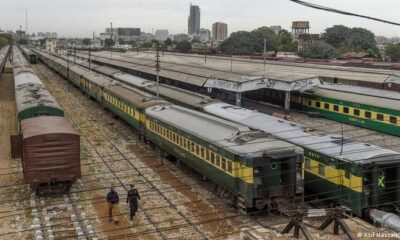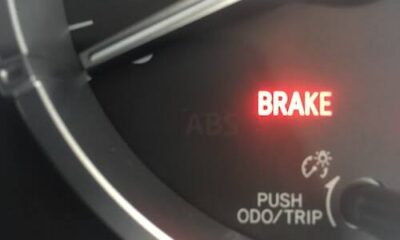AVIATION
Can aircraft keep flying if they lose their only vertical stabilizers
The simple answer is no. First of all, there has not been a single event where an aircraft stayed aloft after losing the vertical stabilizer. The B-52 that survived did so because it still had a part of its stabilizer remaining after a huge chunk of it tore off the air frame. One other contributing factor was the lowering of the landing gear. The B-52’s aft landing gear is pretty far behind the aircraft center of gravity (CG). The gear itself gave the aircraft some directional stability. If the entire vertical stabilizer was torn off the aircraft, there would be no way that the aircraft would have survived that. It was proven just a few days later, when a B-52 on an operational mission lost its vertical stabilizer and crashed shortly after.
B-52 test flight over New Mexico which lost a part of its vertical stabilizer. The remaining part of the stabilizer and lowering of the landing gear helped to control the aircraft to a safe landing.
The other very famous crash involving in flight separation of the vertical stabilizer is the case of the Japan airlines flight 123. Even in this crash, a part of the stabilizer did remain. According to the investigation report, about 45% of the vertical stabilizer was still attached to the aircraft. If the flight crew did not lose their hydraulics, which made it nearly impossible to control the aircraft they might have landed somewhere safely with the help of the remaining part of the vertical stabilizer. But even with over 45% of the vertical stabilizer intact, the aircraft was highly susceptible to dutch roll. The pilots were able to dampen this by the use of differential engine power and lowering of the landing gear. But again according to the crash report, while the control of oscillation the vertical axis was somewhat dampened, a pilot could not have controlled the oscillations with engine power alone, because the dutch roll oscillations are far too quick for the engine power to counter due to the inherent lag of jet engines.
JAL 123 before the crash. A part of the vertical stabilizer did remain, but the aircraft still underwent large oscillations in the directional axis.
Now let us see the technical aspects of losing the vertical stabilizer. Most of the modern aircraft tend to have strong lateral stability because of their swept wings. When subject to a side slip (relative air flow from a side of the aircraft), the windward wing becomes less swept. That is, the air flow interacts the wing with a low sweep angle. This makes it generate more lift than the other wing creating a bank. The side effect of this is the increased induced drag over this wing which creates a yaw. This causes the other wing to move faster through the air causing it to create more lift and the aircraft rolls to the opposite direction, repeating the cycle. When you have a vertical stabilizer, this dutch roll is dampened. This is because in a side slip, the air flow over the stabilizer will try to point the aircraft into the air flow or the wind reducing the side slip angle to zero. And with yaw dampers, the rudder is controlled in such a way that the dutch roll is always countered. Without the vertical stabilizer the aircraft cannot be easily tamed in such a condition and it will continue to oscillate due to dutch roll increasing the drag over the air frame, making it extremely difficult to control the aircraft.
The Dutch roll.
An example of an aircraft which lost its vertical stabilizer as a whole was the American airlines flight 587. Soon after the loss of the stabilizer, the aircraft spiral dived into the ground. Another example is the mid air collision between a Boeing 757 and a Tupolev Tu-154 over Germany. When the Tu-154 collided the B757, it tore away over 80% of the 757’s vertical stabilizer. The pilots of the Boeing lost control of the aircraft and the it dived into the ground pretty much similar to the case of American flight
-

 AVIATION5 years ago
AVIATION5 years agoPhoto News: Air Peace commence flight operations to South Africa
-

 Car News5 years ago
Car News5 years agoPolestar is recalls over 2000 electric cars due to software bug
-

 RAIL4 years ago
RAIL4 years ago36 Killed in Pakistan Train Accident
-

 Technology5 years ago
Technology5 years agoCommon mistakes in CO₂ emissions calculations
-

 Business5 years ago
Business5 years ago2016 Volvo XC60 review and specifications
-

 Reviews5 years ago
Reviews5 years ago2021 Audi A6 Specifications and Review
-

 Reviews3 years ago
Reviews3 years agoDebutant Kia’s new K8 sedan benchmarks luxury, safety
-

 SAFETY / CAR CARE5 years ago
SAFETY / CAR CARE5 years agoHandbrake warning light; what it means and what to do
